Featured Exhibits
Sign up for the Newsletter
Advertise on ParachuteHistory.com
Disclaimer
Privacy Policy
About
Sentinel
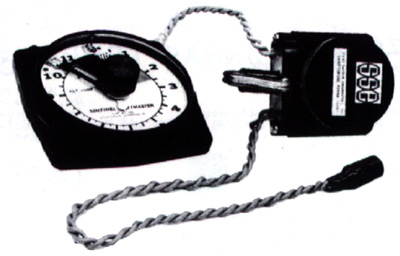
The Sentinel was first introduced to sport parachuting in 1959. By 1969, there were 32 confirmed saves by the Sentinel.
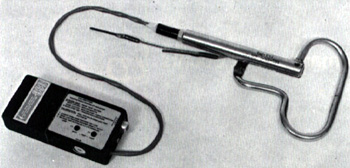
The Sentinel MK 2000 consisted of a sensing unit wired to a power actuated ripcord handle for side pull, chest mounted reserves.
The sensing unit was the brains of the unit. It sensed rate of descent and altitude. The power actuated ripcord was the muscle of the unit. Once the sensing unit sensed it should fire, it sent a signal to the power ripcord, via cables, to tell the ripcord to flex its muscles.
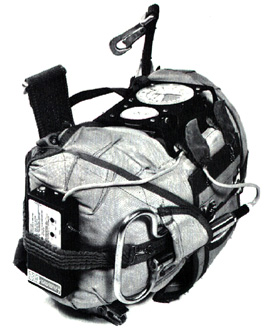 The installation specifically called for placing the black box under the pack opening bands on the right hand side of the reserve. As you can see in the picture, the cable connecting the sensing unit and power ripcord was loosely hanging. This caused problems for many jumpers.
The installation specifically called for placing the black box under the pack opening bands on the right hand side of the reserve. As you can see in the picture, the cable connecting the sensing unit and power ripcord was loosely hanging. This caused problems for many jumpers.
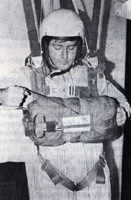 Sometimes a jumper would end up pulling on the cable, instead of the ripcord. The cable pulling usually broke wires in the cable. The sensing unit's electronic signal would not reach the power ripcord.
Sometimes a jumper would end up pulling on the cable, instead of the ripcord. The cable pulling usually broke wires in the cable. The sensing unit's electronic signal would not reach the power ripcord.
An improvement over this installation was the development of the Smith Channel.
In 1974, Andre Smith was the manager of the Green Beret Spport Parachute Club. He observed a student fall down to about 400 feet before a flash of white finally appeared. The student did not pull the main and the Sentinel did not fire, although it was in perfect condition. He concluded that the student had pulled on the cable between the sensing unit and power ripcord, disconnecting the unit and preventing the ripcord to actuate. Several other incidents were exactly the same.
Smith set out to find a way to prevent this from happening. He made a channel from Type 12 nylon webbing that was sewn to the reserve container. The channel prevents the cable from being accidently pulled and prevents misrouting. Sometimes the cable was routed under the top pack opening bands. This could prevent the top and right side flap from opening.
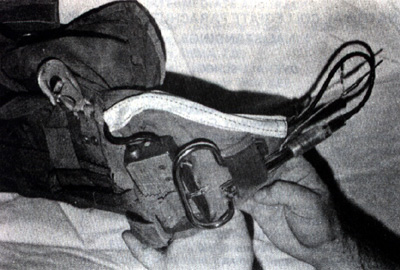
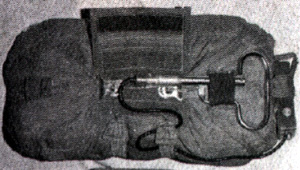 A reserve with a standard installation. The cable is exposed and can be mistakenly pulled by a jumper. The cable is tucked under the pack opening bands (POB) on the top flap. Misrouting is easy to do if the cable is routed under the POB. This type is misrouting could prevent the top and side flaps from opening.
A reserve with a standard installation. The cable is exposed and can be mistakenly pulled by a jumper. The cable is tucked under the pack opening bands (POB) on the top flap. Misrouting is easy to do if the cable is routed under the POB. This type is misrouting could prevent the top and side flaps from opening.
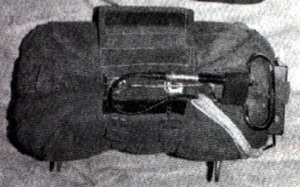 A reserve with a Smith channel clearly shows the better set up. People are less likely to grab the cable and the routing of the cable is ensured.
A reserve with a Smith channel clearly shows the better set up. People are less likely to grab the cable and the routing of the cable is ensured.
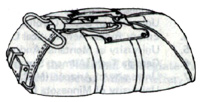 Another solution to the exposed wire was to mount the Sentinel MK 2000 sensing unit upsidedown, so that the wire comes out the bottom. The wire is then tucked under the right side flap. The wire also had to be over the pin protector flap.
Another solution to the exposed wire was to mount the Sentinel MK 2000 sensing unit upsidedown, so that the wire comes out the bottom. The wire is then tucked under the right side flap. The wire also had to be over the pin protector flap.
Sentinel MK 2000 Operational Parameters:
- fires when a jumper is below 1000 ft AGL AND has a descent rate greater than 30% of terminal velocity.
- self test indicating system for battery and actuator cartridge
- power ripcord actuating handle
Operation Procedure: At ground level, zero needle to "0". Just prior to exit, turn the red knob clockwise until the black quadrant seats in click stop and "arm" appears in quandrants window. After main is properly opened, turn quadrant until "off" appears.
The unit is supposed to be mounted on the right side of a chest mounted reserve, not on top.
Many units sent back to SSE, claiming to be bad, were found to have corroeded batteries, incorrectly installed batteries, loose plugs or damaged wiring.
1974: Units with Serial Numbers 4491-4661 recalled for mandatory service inspection - at no cost.
[Products] | [Services]
[Join Our Mailing List] | [Advertise on ParachuteHistory.com]
[ ]
[Disclaimer] | [Privacy Policy] | [About]